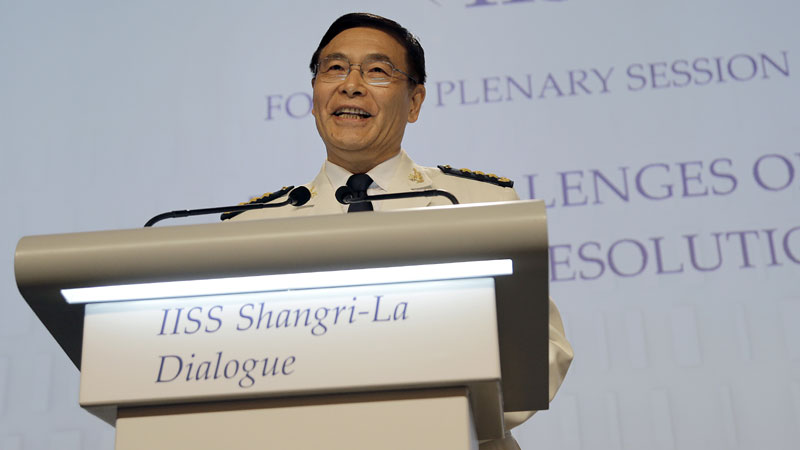
China’s Deputy Chief, Joint Staff Department, Central Military Commission, Adm. Sun Jianguo delivers his speech about “The Challenges Of Conflict Resolution” at the 15th International Institute for Strategic Studies Shangri-la Dialogue, or IISS, Asia Security Summit on Sunday, June 5, 2016, in Singapore. (AP Photo/Wong Maye-E)
SINGAPORE—China on Sunday hit out at US “provocations” and said it was not afraid of “trouble” over its territorial disputes with neighbors in the South China Sea.
“The South China Sea issue has become overheated because of the provocations of certain countries for their own selfish interests,” China’s Adm. Sun Jianguo told a security summit in Singapore.
Sun spoke one day after US Defense Secretary Ashton Carter warned that Chinese construction on Panatag (Scarborough) Shoal in waters within the territory of the Philippines would prompt “actions” by the United States and other nations.
Carter declined to elaborate when pressed on Saturday over what “actions” Washington might take if China moved to construct an artificial island on Panatag Shoal.
But he proposed stronger bilateral security cooperation with China to reduce the risks of a mishap.
He also proposed a “security network” of countries in the Asia-Pacific region whose militaries would train together and eventually operate together.
On a visit to Mongolia on Sunday, Secretary of State John Kerry also warned Beijing against setting up an air defense identification zone over the disputed waters, saying it would be a “provocative and destabilizing act.”
Rhetoric has escalated ahead of a ruling from the United Nations Permanent Court of Arbitration in The Hague on a case brought by the Philippines, a longtime US ally, against China, which has shunned the proceedings and says it will not recognize any ruling.
Military muscles display
Sun, in a clear reference to Washington, said “freedom of navigation” patrols in the South China Sea were a display of “military muscles” and that China was being forced to “accept and honor” the tribunal’s ruling.
“China firmly opposes such behavior. We do not make trouble, but we have no fear of trouble,” Sun, the head of the Chinese delegation to the Singapore forum known as the Shangri-La Dialogue, said in prepared remarks.
Great Wall of self-isolation
In an open forum, he addressed Pentagon chief Carter’s statement on Saturday that Beijing risked building a “Great Wall of self-isolation” with its military expansion in the South China Sea.
Despite repeated notes of concern from countries such as Japan, India, Vietnam and South Korea, Sun rejected the prospect of isolation, saying many of the countries present at the security forum were “warmer” and “friendlier” to China than a year ago.
“We were not isolated in the past. We’re not isolated, and we will not be isolated in the future. Actually, I am worried some people and countries are still looking at China with a Cold War mentality and prejudice,” Sun said in response to questions from other delegates.
“They may build a wall in their mind and end up isolating themselves,” he said.
In his speech, Sun said “countries not directly concerned are not allowed to sabotage our path of peace for selfish gains.”
Competing claims
Hong Kong’s South China Morning Post has reported that China plans to establish an outpost on Panatag Shoal, internationally known as Scarborough Shoal, located 230 kilometers off the coast of Zambales province in the Philippines, which considers it part of its exclusive economic zone (EEZ).
China claims nearly all of the strategically vital sea and has developed contested reefs into artificial islands, some topped with airstrips.
The Philippines says China took effective control of Panatag Shoal in 2012, stationing patrol vessels and shooing away Filipino fishermen, after a two-month standoff with the Philippine Navy.
Without military muscle to defend its territory, the Philippines brought a case to the UN arbitration court, challenging China’s sweeping claims to the South China Sea and asking that its right to exploit resources within its EEZ be honored.
The court is expected to hand down a ruling in the coming weeks despite China’s refusal to recognize it.
Apart from the Philippines, Brunei, Malaysia and Vietnam also have competing claims in the South China Sea, which encompasses vital global shipping lanes and is believed to have significant oil and gas deposits.
Freedom of navigation
China’s territorial claims, based on controversial historical records, have also pitted it against the United States, which has conducted patrols near the Chinese-built artificial islands to press for freedom of navigation.
Pentagon officials say two Chinese jet fighters last month conducted an “unsafe” intercept of a US spy plane in international air space over the South China Sea.
On the upcoming decision by the UN tribunal on the Philippine case, Admiral Sun reiterated on Sunday that China does not recognize the court’s authority.
In this Wednesday, May 25, 2016 file photo, U.S. Defense Secretary Ashton Carter comments on the course an unmanned surface vehicle traveled in the bay, which he had plotted on a computer at the Naval Undersea Warfare Center in Newport, R.I. China on Monday, May 30, lashed out at criticism from Carter, accusing him of harboring a Cold War mentality and saying Beijing has no interest in “playing a role in a Hollywood movie” of Washington’s design. (AP Photo/Jennifer McDermott, File)
He said China wanted to solve the dispute with the Philippines bilaterally and said the door was open for dialogue with incoming President Rodrigo Duterte.
Duterte said on Thursday he would not surrender the Philippines’ rights over Panatag Shoal.
Sun on Sunday repeated China’s pledges to seek a peaceful solution to the territorial dispute.
“China has the patience and wisdom to settle any disputes through dialogue. We also believe the related countries have the wisdom and patience to make peace,” Sun said. “I’ve always believed that shaking hands is better than clenching fists.” The wires